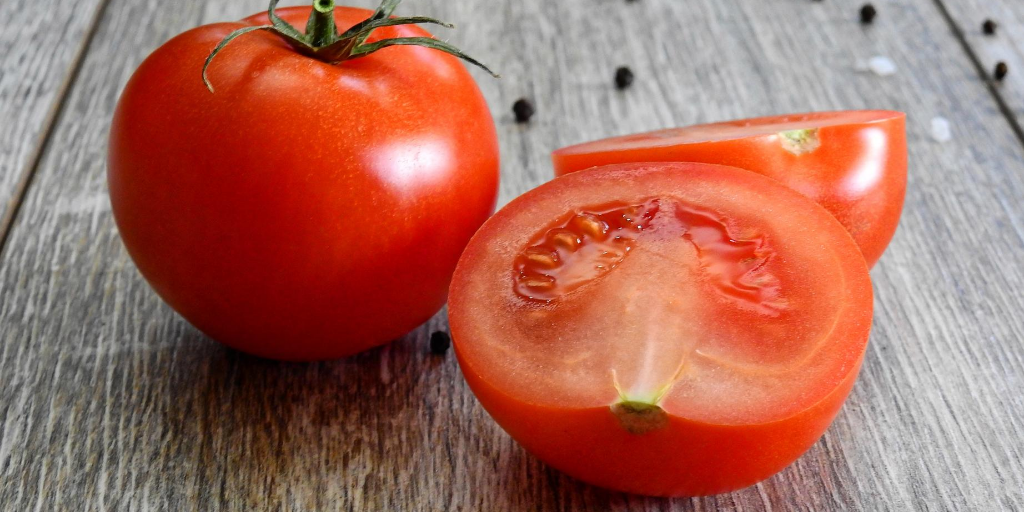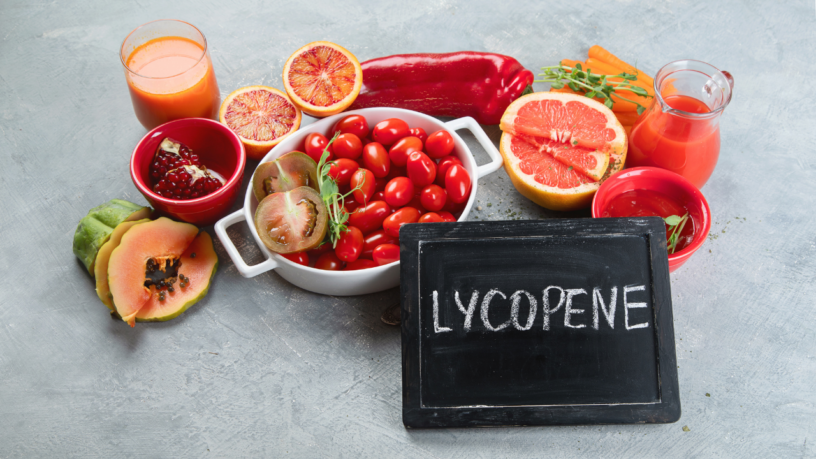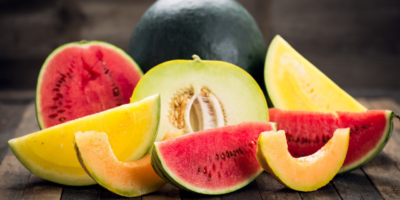Lycopene is a powerful antioxidant in the carotene family with many health benefits. Antioxidants are compounds that protect the body from damage caused by free radicals. When free radicals accumulate in the body, it can cause oxidative stress related to certain chronic diseases, including cancer, diabetes, heart disease, and Alzheimer’s. This natural compound is found in bright red fruits and vegetables like tomatoes, watermelons, and grapefruit. Lycopene is a carotene, with yellow, orange, or red pigments giving this plant its color. Lycopene has been associated with many health benefits, including the prevention and protection of diseases. Tomato products with the highest levels of lycopene are ketchup, tomato juice, and pizza sauce are considered to be the highest sources of lycopene in the average diet for a person living in the United States, accounting for 80% of lycopene in the population.


1. Top Lycopene health benefits
1.1 Lycopene health benefits: Fight off some cancers


✅ Thanks to its powerful antioxidant properties, Lycopene can prevent or slow the growth and spread of certain types of cancer. Test-tube studies show that this nutrient slows the growth of breast and prostate cancers by limiting tumor growth. In humans, observational studies show a relationship between high levels of carotenoids and a 32% – 50% lower risk of lung and prostate cancer. Men who consumed at least two servings of lycopene-rich tomato sauce per week had a 30% lower risk of prostate cancer than those who ate less than a portion of tomato sauce per month in the control group.
1.2 Lycopene health benefits: Good for heart health


✅ The antioxidant effect of Lycopene also helps reduce the risk of developing heart disease and stroke. This is partly because they have the potential to reduce heart disease risk factors such as reducing free radical damage, lowering total and bad LDL cholesterol, and increasing good HDL cholesterol. High levels of lycopene in the blood can increase life expectancy in people with metabolic syndrome (Metabolic syndrome is the name of a group of conditions that occur simultaneously and may lead to cardiovascular disease or type 2 diabetes).
✅ In a 10-year study, people with metabolic syndrome who had high blood levels of lycopene had a 39% lower risk of premature death. In another 10-year study, this nutrient-rich diet was associated with a 17% – 26% lower risk of heart disease, reducing stroke risk by 31%.
1.3 Lycopene other health benefits


- Help protect skin: In a small 12-week study, participants were exposed to UV light before and after consuming 16 mg of lycopene from tomato paste or a placebo. People who use tomato paste have a less serious skin reaction when exposed to ultraviolet rays. In another study, taking 8 -16 mg of lycopene daily from food or supplements helped reduce the level of skin redness after UV exposure to 40% – 50%. However, lycopene’s UV protection is limited and not considered a good alternative to using sunscreen.
- Improve your eyesight: Lycopene can prevent or delay cataract formation and reduce the risk of macular degeneration – the leading cause of blindness in older adults.
- Brain protection: Lycopene’s antioxidant properties may help prevent seizures and memory loss due to age-related diseases, such as Alzheimer’s.
2. Food sources are rich in Lycopene.


✅ All-natural foods colored from pink to red are often rich in lycopene. Below is a list of the most lycopene-rich fruits.
- Dried tomatoes: 45.9 mg on a 100-gram serving.
- Whole tomatoes: 21.8 mg on a 100-gram serving.
- Guava: 5.2 mg on a 100-gram serving.
- Watermelon: 4.5 mg per 100-gram serving.
- Fresh tomatoes: 3.0 mg on a 100-gram serving.
- Canned tomatoes: 2.7 mg on a 100-gram serving.
- Papaya: 1.8 mg on a 100-gram serving.
- Pink grapefruit: 1.1 mg on a 100-gram serving.
- Cooked red peppers: 0.5 mg on a 100-gram serving.
3. Notes when using Lycopene
- When consumed in food, lycopene is safe to eat for everyone. Eating too much lycopene can lead to a condition called lycopenemia, which is the orange or reddening of the skin. This condition is harmless and disappears by eating a diet lower than lycopene.
- Lycopene is available in supplement form but should be avoided for women who are pregnant or breastfeeding because some studies show that daily supplementation increases the risk of preterm birth and low birth weight.
- Lycopene may also increase the risk of bleeding when taking certain medications such as aspirin and anticoagulants such as warfarin. The same thing happens when mixing lycopene and herbs can increase bleeding, like ginkgo.
- People who take medication for low blood pressure should not take lycopene, as it can cause even lower blood pressure.
Recommended for you
🎁 NOW Supplements, Lycopene 10 mg with Natural Extract from Tomatoes, Free Radical Scavenger


✅ Since 1968 NOW has been a leader in the natural products industry. Even when healthy foods and natural supplements weren’t mainstream, they’ve never wavered from their mission – to provide value in products and services that Empower people to lead healthier lives.
✅ NOW Lycopene features LYC-O-MATO, a patented tomato complex with a full complement of tomato phytonutrients, including natural lycopene. Natural Lycopene is known for its powerful free radical scavenging properties. Clinical studies indicate that Lycopene helps to support cardiovascular health and normal immune system function. Directions: As a dietary supplement, take 1 softgel, 1 to 3 times daily with food.






Leave a Reply